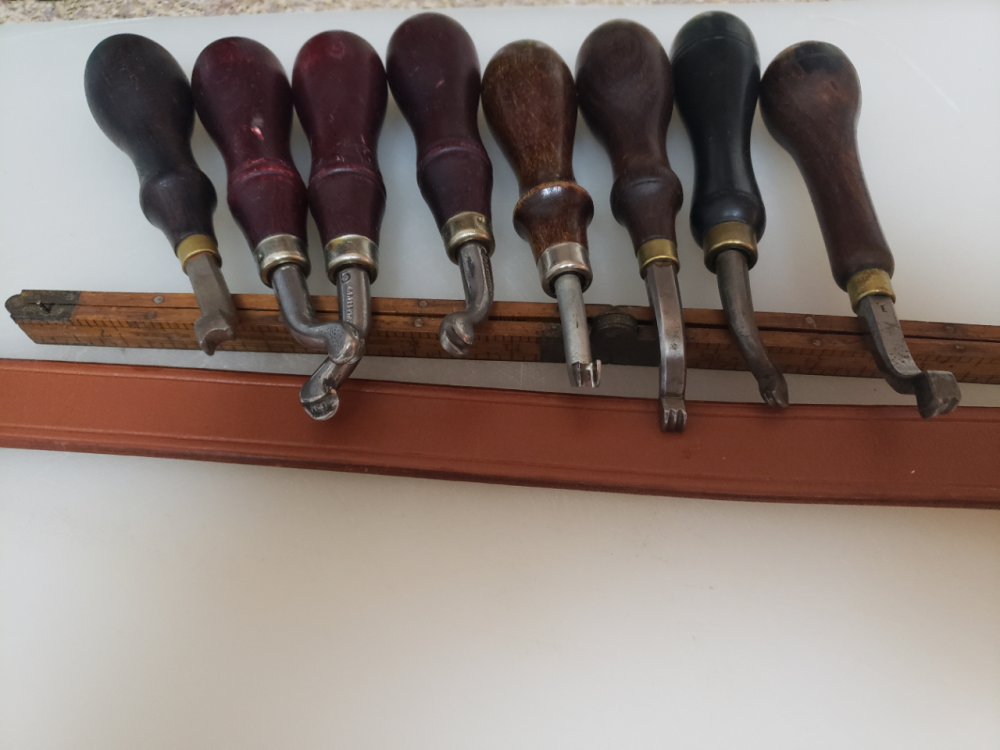-
Posts
1,935 -
Joined
-
Last visited
Content Type
Profiles
Forums
Events
Blogs
Gallery
Store
Everything posted by billybopp
-
That's a very clever idea! I like it! - Bill
-

When can you call yourself a craftsman?
billybopp replied to Handstitched's topic in Leatherwork Conversation
Most buyers probably cannot tell the difference between hand sewn and machine sewn, nor do they care! BUT some people have a discerning eye and CAN tell at a glance how an item was sewn, and they are willing to pay for that difference, whether because they just like the look or because they believe that hand sewn is just better. The same thing applies to clothing, for that matter. Most of us are perfectly fine with off-the-rack suits, whether that be Wal-Mart at the low end or Hart Schaffner Marx or Armani at the high end. Others want (or sometimes need) a tailored suit that is machine sewn and are perfectly fine with that. The rare few can tell the difference between machine sewn and hand sewn tailoring, and are willing to pay for it, either because they want the HIGHEST quality or they want to impress others with that discerning eye to know the difference. It's all in what the customer wants, and is willing to pay for. - Bill -
Let me begin with stating that I do not have ANY buddies that produce videos on the internet. I've never met anybody that does videos online, as far as I know anyway. So do NOT put words into my mouth (or should that be on my screen). I won't disagree that there is a lot of information out there that is repeated, but that information can be presented in many different ways. I'm glad of that. Not everybody learns in the same way. The way that one person presents it may not click with one viewer, and yet with another presenter it totally makes sense. Some people need a step by step presentation, others can easily make the leap from one point to another without everything in between being shown. What is obvious to one person may not be to another. For that matter, video isn't a great way to learn for some people, and books may work better for them. For the same reason that one video might work for one learner and not another, the same is true with books. But at least the videos are mostly free, whereas libraries are sadly lacking in leather working books - so they are generally not free. And yes! Somebody that has never made a holster before MIGHT need to be shown that they need to trace around the gun, and how to do that. For example, do you do a direct trace around the gun with the pen straight up and down? Or do you need to add in a seam allowance and make that trace line 1/4" out from the actual gun itself. If you had never made a pattern, you would not know.
-
I do know. Springfield leather has python and several other skins... Both print and "real". And you are still first rate dick. You COULD have approached people's confusion by saying something like. "I could have been more clear with my question" . But you did not. Instead you decided to insult anybody that asked. Your disdain for video or anybody (other than Hank) who tries to make one.... Or for that matter anybody that looks at one is very well known by anybody that has been here for any length of time. So you decided to express that,once again, and use that as an insult. I have seen you repeatedly shut down anybody else's opinion, whether right or not because it does not fit within your incredibly narrow mindset. Not cool. If anybody else finds my language or opinion here insulting, I apologize to you but I had to speak my mind. It has been brewing for a while now. If any mod feels my commentary inappropriate, feel free to remove it. JLS. You are a dick.
-
You're SUCH a DICK.
-
Well darn. I'm 1500 miles too far away to drop by. Especially if you throw in a few pounds of steaks and burgers with that hide!
-

All leather closure methods for items like boxes and cases?
billybopp replied to LederMaschinist's topic in How Do I Do That?
This is not really closer, but a different angle. If I remember right, the 'keeper loops' are 3/8" and loop through holes in the front of the bag, sewn in at the center. The straps are 1" wide and the tabs are cut from the ends of the straps and sewn on about half-way around. Straps didn't really need to go all the way around, but I liked the look. The gussets are 3/8" purple-heart wood (if I had known how hard that stuff was I would've chosen something else! They were really hard to shape with hand tools only!). - Bill -

All leather closure methods for items like boxes and cases?
billybopp replied to LederMaschinist's topic in How Do I Do That?
This is just held by friction, and is working well after a couple of years use. - Bill -
If you're making your pattern on paper, just mark a line where you want our stitches to run before fully marking out the pockets then press your stitching chisel or pricking iron along the line. It's then pretty easy to see just where you can mark out your pockets. If it's somebody else's design, you can do the same and just adjust the size. - Bill
-
Probably the best way to avoid that odd stitch length going over a card-slot tab is to cheat a little in the design stage! Make the card slot tabs a little bigger, or smaller, so that your chisels straddle the edge top and bottom. In most cases it will be a very small adjustment, but will get your stitch length spot-on. You can do the same for the over all size as well. Pre-planning makes assembly easy-peasy. Or at least easier-peasier. - Bill
-
Leather does tend to wrinkle when you bend it in two directions as in a U shaped gusset. Some leathers are more cooperative than others. Skiving can help, but if the curve is tight a relief cut (V-shaped cut) is a very effective method. Without some special measures, the stitch length will change in the curve. If you maintain the stitch length on the outside the inside will become shorter, or if you maintain the inside length will become longer. Most choose a shorter inside stitch, and for some projects that's perfectly acceptable. There is a workaround that allows both inside and outside to stay the same, but it takes a little work and a little thinking. You'll mark a consistent stitch length on both outside piece and on the side panel. They'll match up as normal on the straight part, but when you come to the curve there will be more holes on the outside than the inside. You'll use a few double stitches on the inside to make up the difference. Use an awl to make your holes at an angle and hit your inside marks when they get out of line - first making your angle a little forward and then a little backward to make a double-stitch when things get too far out of line. I can't think of a better way to describe it - but that's what you do! - Bill
-
You may want to check out stitching chisel reviews by @Dangerous Beans (Nigel Armitage)'s youtube channel. There is a LOT of good information there and a LOT of chisel reviews. https://www.youtube.com/channel/UC8urn9l3pybW5LztUa6zbOA -Bill
-

Just ordered a hand crank CB3200!
billybopp replied to kyleboedeker's topic in Leather Sewing Machines
By golly THAT'S customer service! LOL -

Did Tandy drop their WC & Elite gimmicks?
billybopp replied to Studio-N's topic in Leatherwork Conversation
Yes they did! Amongst other changes. - Bill -

Handbag for the Wife
billybopp replied to Reegesc's topic in Purses, Wallets, Belts and Miscellaneous Pocket Items
In certain circles, this Santa already has a bad reputation. In a good way, of course. Love the video!! Oh, I certainly agree about the luxury market and whole-heartedly support it. But there's luxury, and then there's excess, followed at some distance by extreme excess. I'm pretty sure that a bag that expensive ventures into extreme excess. - Bill -

Handbag for the Wife
billybopp replied to Reegesc's topic in Purses, Wallets, Belts and Miscellaneous Pocket Items
some people have more dollars than sense. - Bill -
Once you find your own personal style of tooling - or even if you like tooling, it can be worth upgrading tools. The nice thing about having a collection of lesser tools, too, is that the ones that don't fit your style STILL get occasional use, and you'll have them for those rare times! As for swivel knives, as long as the body fits your hand and operates smoothly, they're pretty much all fine. The blade is the part that makes a difference, and as long as that gets sharp and doesn't need excessive sharpening that's good to go too. -Bill
-
Tandy tools went from being good to bottom of the barrel for many years. Now, in the face of some of the crap coming at us out of China, they're not looking so bad again, particularly for the price. Tandy's pro line are good for the price. Many of the regular Tandy craftools are perfectly serviceable and great to learn with. Some are fine to continue with! The quality of some tools is more critical than others. For example basketweave and geometric tools need to be aligned just right, so better quality tools are a must for those. others need to make very crisp impressions, so quality is more important there. Bevelers, and some others aren't so critical and less expensive tools work well from the get-go. Additionally, the tools you choose will depend on your personal tooling style. But you can't really know YOUR style until you've done some work. My suggestion is to start with inexpensive tools until you know which ones you use all the time, and then slowly replace those with better. The exception being those above geometrics, etc. where inexpensive tools will just lead to frustration. - Bill
-
They can be used heated or cool. Usually cool works fine, but some leathers are a little more stubborn than others and require some heat. Here is a picture of some of my single and double creasers along with a strap example of how they're used. Most are CS Osborne, one unbranded, I also have some Gomph and others. -Bill
-
That is an edge creaser. I have several of them in various sizes, and love 'em! It is used to place a decorative line a certain distance in from the edge of a piece of leather, mostly straps and such. The longer leg runs along the edge, and the shorter one makes the crease. It's a neat, attractive look. That said, tho, you don't necessarily have to use it for what it was meant. If the round fits over your edge, it may well do what you want! -Bill
-
Not sure what you have there, but tokonole is nothing like the tragacanth that I have used. The gum tragacanth that I have used works OK for a little while, but eventually the edges wear and fibers come loose. That does not happen for me when I use tokonole, it makes a nice tight gloss edge that stays that way. - Bill
-
I'm rather fond of Tokonole for burnished edges. It leaves a nice very slick durable edge. - Bill



